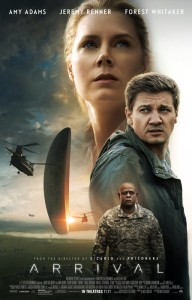 Director Dennis Villeneuve has crafted a masterpiece, a science fiction film that turns its gaze from the stars and into the corners of the human condition. Arrival deserves to stand alongside the best of the genre, like 2001: A Space Odyssey, Solaris, Interstellar, Contact, and Blade Runner. As I’ve written before, science fiction is at its best when it holds a technical, metallic, polished mirror up to the viewer, so she might see herself more starkly and in sharp, painfully-detailed, relief.
Director Dennis Villeneuve has crafted a masterpiece, a science fiction film that turns its gaze from the stars and into the corners of the human condition. Arrival deserves to stand alongside the best of the genre, like 2001: A Space Odyssey, Solaris, Interstellar, Contact, and Blade Runner. As I’ve written before, science fiction is at its best when it holds a technical, metallic, polished mirror up to the viewer, so she might see herself more starkly and in sharp, painfully-detailed, relief.
The downside of writing about Arrival, at least for those who have not seen it, is that what makes it memorable must go unmentioned so that it might be fully experienced by the uninitiated. The plot is simple and, unlike the rest of the movie, the setup is formulaic. Extraterrestrial crafts appear in twelve places across the globe, seemingly randomly distributed. They hover just above the ground in easy reach of curious humans and their governments, which soon cordon them off and begin to engage the ships with small groups of scientists, linguists, and military personnel. The vessels show no menace and do no harm, but their presence destabilizes markets and disrupts society. Governments consider them a possible threat, so they cooperate by sharing precious information with the hope of mutual survival. That arrangement, though, is fragile.
Louise Banks (Amy Adams) is a linguist and professor who specializes in translation. When we find her, she is downtrodden, suffering, but obviously devoted to her craft. As the world crumbles, she shows up to teach and there are no more students, for they have chosen things besides class. She, it seems, has no more options. Colonel Webber (Forest Whitaker) shows up, on behalf of the United States military, to ask for help. Banks heads a team dedicated to communicating with the aliens, while physicist Ian Donnelly (Jeremy Renner) leads a group devoted to scientific questions about their intentions and capabilities.
Though Donnelly and Banks work together cohesively, the pairing highlights the differences between their chosen fields. Banks approaches questions systematically, and Donnelly is not beholden to some rigid conception of the scientific method, but the two arrive at knowledge via different paths. Banks understands the importance of context, while Donnelly strives for transcendent patterns. There is a philosophical question about the pursuit of knowledge that is the intellectual heart of Arrival. The film slants toward Banks’ methods, for sure, but it does not trivialize nor does it degrade the notion of science or the quest for the absolute.
The middle third of the film is devoted to Banks’ efforts to communicate with the heptapods (as Banks calls them) they encounter when aboard the alien ship. Instead of oral methods, she chooses text and finds the visitors incredibly proficient in communicating large amounts of data in compact pictographs that are, like language itself, ethereal, especially when bridging not only two cultures, but two worlds. As she and Donnelly make progress, the world around the alien crafts deteriorates.
The final third of Arrival reveals its genius as it plumbs emotional depths. Banks and Donnelly try to unravel the origin and purpose of the heptapods and while doing so, Banks reflects on the nature of life’s largest questions. Who am I? Why am I here? What is my purpose in life? What matters most? I don’t agree with all of her answers, but I admire any work of art that makes me ponder them.
Villeneuve takes a spare approach to Arrival. There is relatively minimal use of special effects. The pace is deliberate and I’m sure some critics will say glacial. The story offers few clues and is thankfully light on monologues designed to explain things for those unused to paying attention to a dense film. Villeneuve expects something from Arrival‘s audience. If they provide it, they’ll be rewarded. If they don’t, they are likely to be frustrated. If ticket-buyers come expecting lasers, explosions, and dim-witted banter, they will be disappointed. If they arrive expecting a challenge, they will enjoy Arrival for the thrill it is.
Amy Adams dominates Arrival more than anyone, human or alien. We journey with her as she puts the pieces together, and she frequently relies only on expressions, a slight tremor, or a cocked eyebrow to communicate complex, shattering emotions. Everyone else is solid, but Adams carries the film. She and Villeneuve deserve award consideration, as does the film itself.
Don’t miss Arrival. See it. Discuss it.
Final Grade: 3/3 Eggheads
 Bert Wheeler
Bert Wheeler
 Jeff Haymond
Jeff Haymond
 Marc Clauson
Marc Clauson
 Mark Caleb Smith
Mark Caleb Smith
 Tom Mach
Tom Mach